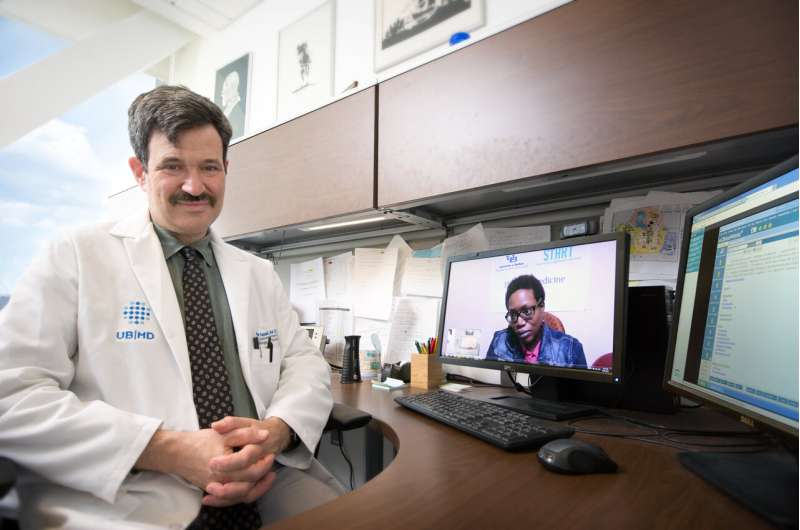This article has been reviewed according to Science X's editorial process and policies. Editors have highlighted the following attributes while ensuring the content's credibility:
fact-checked
peer-reviewed publication
trusted source
proofread
In people with opioid use disorder, telemedicine for HCV was more than twice as successful as off-site referral

People with opioid use disorder who have hepatitis C virus (HCV) were twice as likely to be successfully treated and cured from HCV if they received facilitated telemedicine treatment at their opioid treatment program (OTPs) than if they were referred off-site to another provider. Those are the findings published today by a University at Buffalo team of researchers in the Journal of the American Medical Association (JAMA).
The study is one of only a few randomized controlled trials that have been conducted to determine the effectiveness of using telemedicine to improve health care access for vulnerable populations.
"These groundbreaking results published in JAMA highlight the power of novel approaches in tackling chronic conditions in underserved populations," says Allison Brashear, MD, vice president for health sciences and dean of the Jacobs School of Medicine and Biomedical Sciences at UB.
"The findings pave the way for significant improvements in the lives of participants and offer hope for similar successes in addressing other diseases."
Individuals with opioid use disorder are a particularly challenging underserved population to treat in conventional health care settings, and they are at highest risk for hepatitis C virus infection through needle sharing.
Led by Andrew H. Talal, MD, professor of medicine in the Jacobs School, this study explored the effectiveness of integrating telemedicine into OTPs for HCV management, thereby removing the need for off-site referrals.
90% were cured
The study was conducted from 2017 to 2022 at 12 OTPs in New York State that dispense methadone. Researchers enrolled 602 participants with opioid use disorder who had been diagnosed with HCV. Participants received treatment with direct acting antiviral medications for HCV and were followed for two years after being cured to evaluate for reinfection.
The researchers found that 90.3% of those in the telemedicine arm at an OTP were cured of HCV infection compared to 39.4% of participants referred to an off-site specialist. Two-thirds of those in the referral arm never initiated HCV treatment at all.
During two years of follow-up, there were minimal HCV reinfections.
"Telemedicine leads to high patient retention in care and cure within this population," says Talal.
The researchers also found that being cured of HCV resulted in subsequent health and well-being improvements for participants, including significant reductions in substance use.
After initiating treatment for opioid use disorder, combined with an HCV cure, many individuals were able to successfully seek employment, improve their education status and reduce their involvement with the criminal justice system.
A key advantage was the use of facilitated telemedicine, where telemedicine is integrated into settings where patients are already receiving treatment—in this case, methadone. Since the participants already had strong and established relationships with staff, it was relatively straightforward to provide HCV treatment at the same time.
It was a relatively complex study, where each arm of the study was implemented at each site but at different times. Talal held regular brown bag lunches with OTP staff and patients to directly answer questions and concerns, and to educate them about the infection.
Tangible win
The potential advantages were easy to see. "We had the opportunity to engage in a treatment modality to address a chronic condition that's secondary to opioid use," says Ken Bossert, who was an administrator at the Drug Abuse Research & Treatment (DART) site in Buffalo.
"We could nearly guarantee clients would be cured, and we stressed that once cured, they shouldn't re-expose themselves to risk. So now the patient could say, 'OK, I participate in this study, I'm starting to feel better, and this chronic condition goes away.' It's a tangible win."
It was a win-win for researchers, OTP staff and participants.
"Our findings show that this kind of research can be done in unconventional settings and that leveraging the trust that patients have in these treatment programs can be very helpful," says Talal.
The findings also demonstrate a key benefit of telemedicine: It improves health care access for people with opioid use disorder who typically encounter shunning and stigma in conventional health care settings.
"Our study demonstrates how telemedicine successfully integrates medical and behavioral treatment," he says.
The results demonstrate that telemedicine should be further investigated as an approach to increase health care access for underserved populations experiencing other health conditions.
More information: JAMA (2024).



















